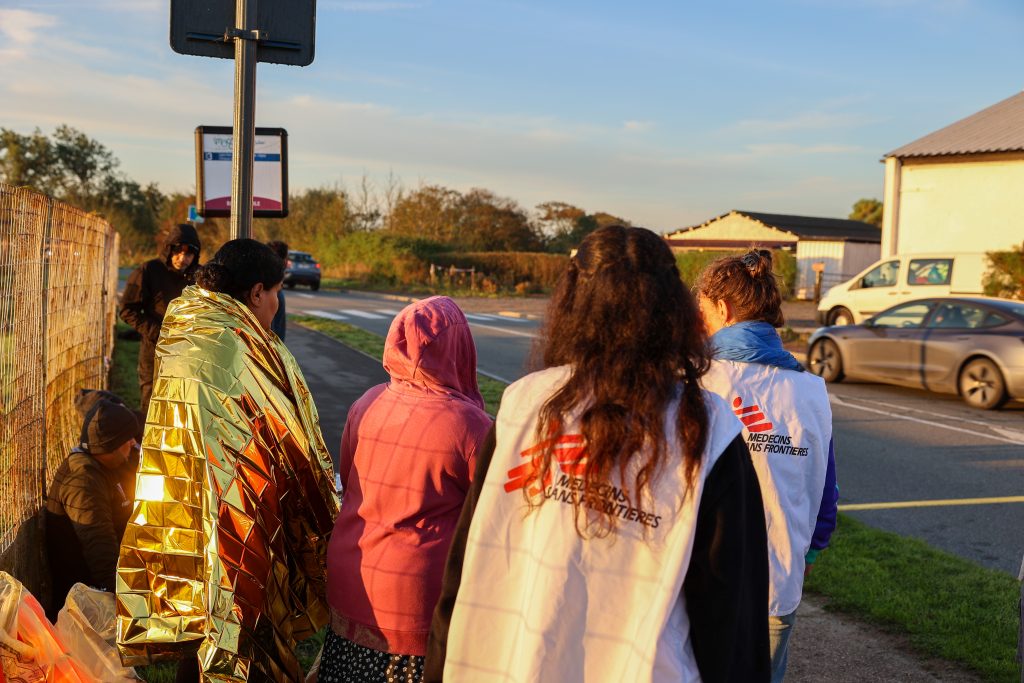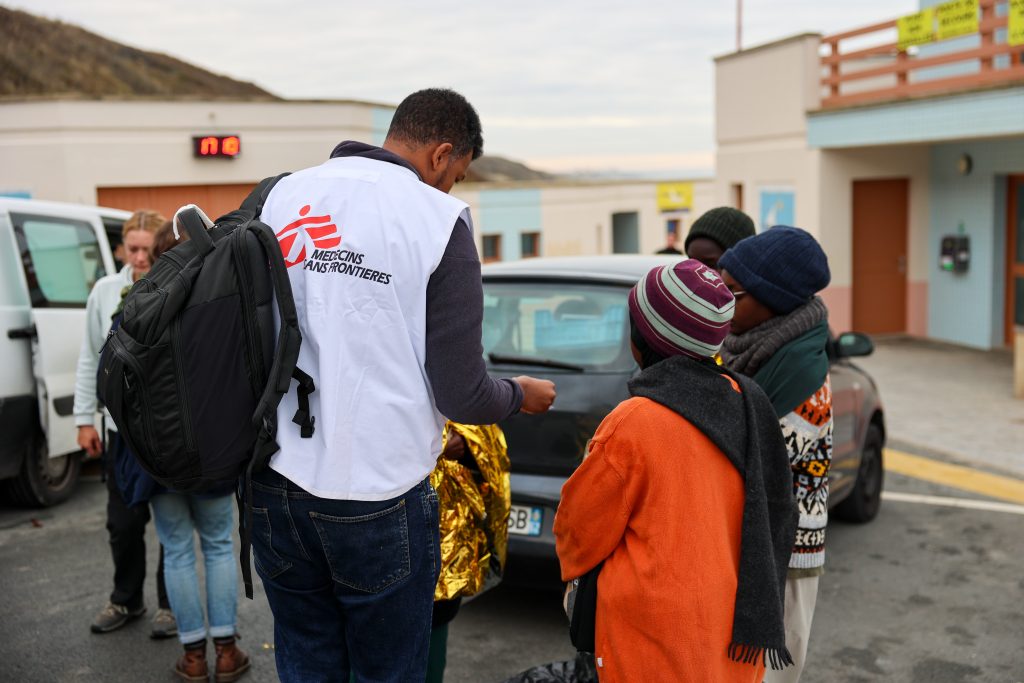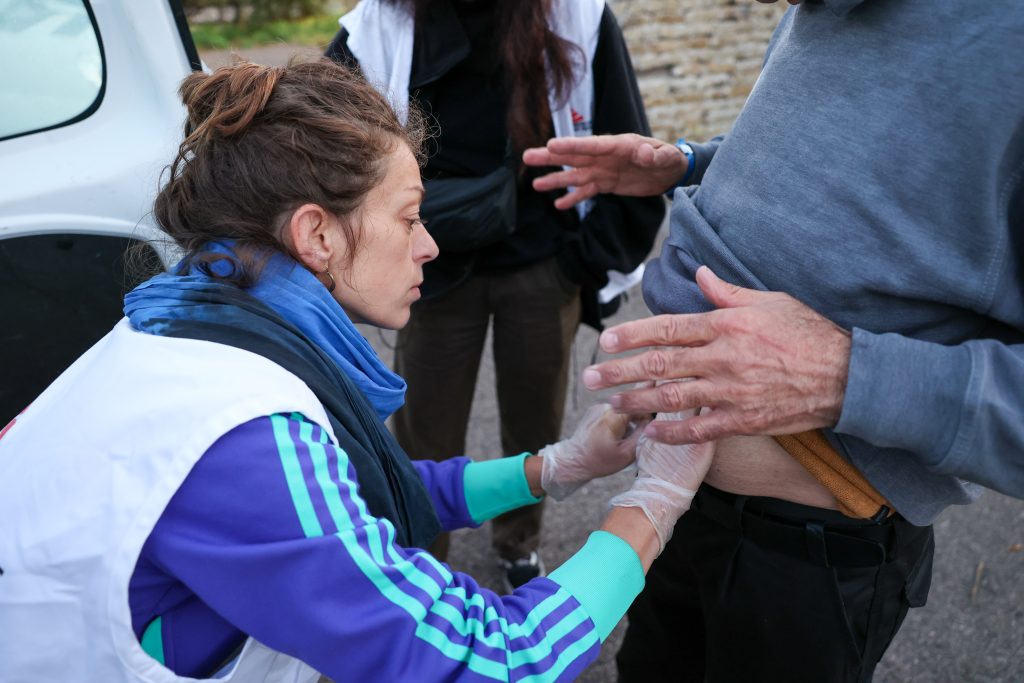In the spring of 2025, Médecins Sans Frontières (MSF) decided to join forces with French association Utopia 56 to take part in coastal patrols in the north of France. Since the start of these joint activities, the MSF team has met more than 1,800 migrants, refugees and asylum seekers who were survivors of shipwrecks or failed attempts to cross the Channel to reach England. More than 200 medical consultations have been carried out. Palmyre Khul, a nurse, and Muneir Mustafa, an intercultural mediator, report on this joint assistance.
In which context do these operations take place?
Palmyre: France and the United Kingdom signed an agreement this summer, called “One in, one out,” which is supposed to “prevent dangerous crossings,” but attempts to cross have not stopped at all in recent months. Between August and the end of October, more than 11,000 people reached the United Kingdom on inflatable dinghies. Furthermore, the number of failed attempts is difficult to estimate, as is the total number of survivors. The conditions for embarkation and crossing are extremely perilous, and many attempts end in failure. Migrants, refugees and asylum seekers often find themselves alone, soaking wet, frozen, in the dark of night, without help or assistance. In the worst cases, when a boat capsizes, injured and traumatised people are left to fend for themselves on the northern French coast, sometimes with fatalities.
Muneir: This is what happened on the night of July 25 to 26, when we were on a mission with volunteers from Utopia 56 and my colleague Camille, a nurse. A boat had capsized with around 70 people on board. When we arrived on the beach, it was complete chaos: there were lots of injured people, people with burns, people in shock, people who couldn’t speak… and one man in cardiac arrest, whom my colleague tried to resuscitate, in vain. A shipwreck is a highly traumatic event.

How do you operate on the northern coast of France?
Palmyre: Coastal patrols involve driving along the northern coast of France, covering a stretch of approximately 150 kilometres from the Belgian border to Le Touquet, in search of people who may need assistance after a failed crossing attempt or shipwreck. Departures often take place in the middle of the night. We join the Utopia 56 volunteers between 3 and 5 a.m. and begin our patrols. We base our activities on the weather and tides: these indicators tell us whether people are likely to attempt to cross the English Channel in small boats. We stop at specific points where we know we will have visibility of the dunes and beaches, to see if we can spot anyone who might need assistance. There are also people who contact Utopia 56 directly to ask for help via their hotline, which is available 24/7: they give us their geolocation and we try to find them.
Muneir: When we arrive to meet a group, we go around to everyone to assess the situation, ask them how they are doing, and understand their needs. We provide medical assistance and Utopia 56 provides material assistance. The two are very complementary: for example, when the people we meet are soaked from head to toe, we know that the risk of hypothermia is high if they are not changed into other clothes quickly, even more so for children and babies. Another identified risk is that of fuel mixing with salt water, which can cause chemical burns. Survivors’ clothes have often become soaked with fuel, which is why it is important to make it possible for them to change into fresh clothes quickly. Utopia 56 volunteers provide people with dry clothes, survival blankets, hot drinks, and something to eat. It is not uncommon for the people we meet to have had no access to food or water for several days.

What are the main needs of the people you have cared for?
Muneir: In most cases, we meet people who are freezing cold, soaking wet, shocked, and disoriented. We provide psychological first aid, paying attention to people’s reactions and practising active listening. This is a way of providing initial support and directing them to the help they need.
As an intercultural mediator, I connect with survivors in a common language—most survivors are Arabic speakers. This facilitates their communication with my colleague, a nurse, to understand their medical needs. I remember, for example, a woman from Sudan who had been separated from her 13-year-old daughter when they were about to board the boat. She and her children had been waiting hidden in the dunes for two days. When the dinghy arrived, there were already about 20 people on board and around 80 people trying to get on. Everyone started running and in the chaos, the little girl managed to get on the boat but her mother didn’t… When we went to meet her, the woman was extremely panicked. I spoke to her in Arabic to reassure her and explain that we were going to help her. Fortunately, the boat her child was on was finally rescued and the family was reunited. But unfortunately, we know that in many other cases, families are never reunited.
Palmyre: Some of the people we meet are injured. For example, we treated a man from Sudan who had injured himself while trying to climb into a boat. He had cut his finger and only had cling film to stop the bleeding. When I examined him, I could see that the cut was deep. We took him to the hospital, where he ended up needing surgery. During these six and a half months of operations, many of the people we encountered were suffering from osteoarticular pain directly related to the conditions of the crossing: people sometimes have to walk for long hours before boarding the rubber dinghies. Once they arrive at the embarkation point, it is not uncommon that panic and the urgency to leave lead to crowd surges and people falling down.

What is the outlook, especially as winter approaches?
Muneir: Given the number of people enduring life in makeshift camps—around 1,500 in Calais and around 2,500 in Dunkirk—attempts to cross the Channel show no sign of stopping. Over the past few months, we have met people who were attempting to cross for the fifth time. They fail but try again out of desperation; they have no other choice. We have met many families with young children and even babies. One must imagine the dead end these people find themselves in and their level of despair. Attempting to cross the English Channel is the only way out these people can find, despite all the dangers and trauma that this can cause.
Palmyre: We know that even in winter, despite increasingly harsh weather conditions, people still attempt to cross. The risks to individuals increase, particularly the risk of hypothermia. At the same time, we have observed a consistent lack of intervention by government services for survivors on the northern French coast. We are therefore considering continuing these coastal patrols in partnership with Utopia 56 and are looking to adapt to the needs. Providing assistance to migrants, refugees and asylum seekers on the coast also means telling them: we care about you, you are not forgotten. It is like bringing back a sense of humanity to these people who are in the greatest need.
-
Related:
- France
- Migrants
- MSF in France












